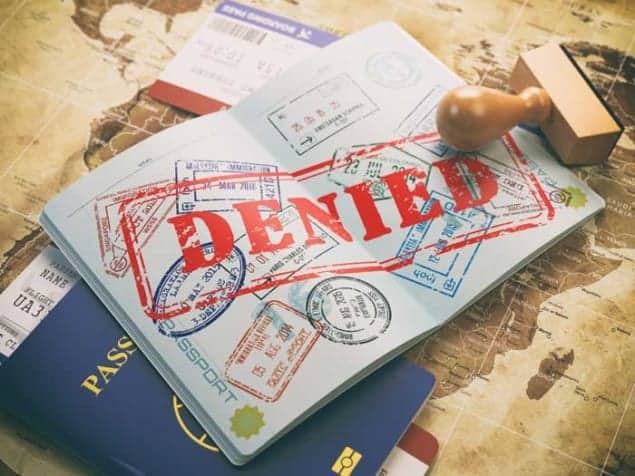Robert P Crease reports on a recent episode at the US border

Galileo Galilei, the controversial Italian astronomer, was recently questioned by a US Immigration and Customs Enforcement (ICE) officer. I managed to obtain a transcript of the encounter.
ICE Passport, please.
Galileo Eccolò.
ICE [Flicks through document.] Ah, so you’re a scientist? I’ve heard you scientists are doing work that threatens American interests.
G Which work? I’ve upset a few astronomical apple carts, but what makes politicians go ballistic these days is meteorology.
ICE Look, your particular academic cranny doesn’t matter. What matters is if your science threatens American jobs, economy and values.
G It can’t. Science doesn’t hurt a nation’s interests. It can only stimulate a country’s activity – make it grow.
ICE That’s not what the politicians say.
G Well, they’re idiots.
ICE Do you know who you’re accusing?
G Powerful idiots.
ICE No, they’re duly elected senators, representatives and members of the executive branch, sworn to defend the country.
G Not all elected politicians understand how best to defend the country. If they did, they wouldn’t argue so much.
ICE Yes, but they are the law of the land, the ultimate authorities.
G You reckon? So why not ask politicians to repair your car, fix your computer or cut out your appendix? It’s because that’s not their skill. Also, it’s way beneath their dignity. Leave that stuff to geeks like me!
ICE Well, politicians make the laws. The American constitution says nothing about restricting their authority, or sharing it with science.
G That constitution was written almost 250 years ago, at a particular historical moment and for a different audience. Its authors knew that times would change and wrote it flexibly, so it could be adapted to changing realities. Modern politicians should pay attention to the words of founding fathers like Benjamin Franklin, John Adams, Thomas Jefferson and James Madison, who weren’t just amateur scientists but realized that using science to understand nature is essential to effective democracy. In determining the real, they thought, science allows politics to craft the possible. As one of my political friends likes to say, “The founding fathers showed how to create legislation, not to legislate creation!”
ICE The safest course is to adhere to the constitution’s literal language.
G Oh, really? What about article 1, section 2, paragraph 3, which treats a slave as three-fifths of a person? If today you believed the literal truth of that, you’d be un-American! The constitution only works today if you adapt it to current reality.
ICE I’m recording you as denying that the constitution is the supreme law of the land.
G What I’m saying is that there are two constitutions, the American constitution and nature’s constitution. Politicians are the authorities for the former, while scientists are the authorities for the latter. These two constitutions – political and natural – cannot conflict. If they appear to conflict, somebody is overstepping their authority. Those who overstep their authority are being un-American. They are violating their oaths of office and endangering the country. If you want to purge America of its enemies, eject the science-deniers.
ICE Sorry, Signor Galileo, this country isn’t yet ready for you and your views. Entry denied!
The critical point
Four centuries ago, when science and society were not yet coupled, investigators into nature like Galileo had to develop clever arguments and rhetorical strategies to justify the value of their work and to defend science as being in the national interest in the face of powerful opposition. Today, equally powerful forces are at work seeking to decouple science and society. It is valuable to revisit the original arguments and strategies that Galileo and his colleagues used to see if they can be recast in modern terms.
Galileo relied on a variety of tactics, including drawing attention to key distinctions, exposing concepts that his enemies had used in empty and abstract ways, turning the arguments of his accusers right back at them, and appealing to authority. Galileo also did not refrain from sarcasm, insults and ridicule, nor from declaring his own piety and patriotism while accusing his enemies of lacking the same.
To create the above conversation I started with Galileo’s famous Letter to Christina of 1615. Nominally addressed to the mother of his patron Cosimo II, who had hosted a gathering at which Galileo’s piety had been questioned, it was meant as an open letter to political and theological authorities to lay to rest issues raised by his astronomical work. I kept the basic structure of Galileo’s response, but replaced words like “Bible” or “theologians” with words like “constitution” and “politicians”. Where he wrote some version of “pious”, I wrote some version of “American”. The result forges an argument that remains clear and powerful.
Truth be told, Galileo’s defence didn’t keep him out of trouble, but it was effective in the long run. No single counter-measure will blunt the forces promoting science denial, and all of Galileo’s rich toolkit of tactics will have to be used. A good starting point to find them is to read his original Letter to Christina.



